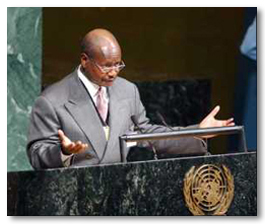The "Social Vaccine"
- ANTO AKKARA
Uganda's aggressive effort to promote abstinence outside marriage, and fidelity within, has become Africa's only success story in fighting AIDS.
 |
Delegates who took part in the 15th International AIDS Conference (IAC), held July 11-16 in Bangkok, were almost literally bombarded with condoms. There were condoms in the welcome kit received by the nearly 20,000 registered participants. Scantily clad young women distributed condoms along with candies as they greeted delegates to the main exhibition hall. A giant inflated condom floated above that hall. Journalists rushing to meet deadlines were delayed by hostesses who insisted on passing out condoms before a press conference could begin.
Condoms were ubiquitous at the IAC, testifying to what has clearly become an obsession among mainstream AIDS activists and UN health agencies.
Nevertheless, Church officials who participated in the sessions at Bangkok and were shocked to find the condoms enclosed with their orientation materials had reason to be pleased before the meeting concluded. For the first time in the history of the international campaign against AIDS, the IAC explicitly and emphatically acknowledged the role that faith-based programs can play in combating the spread of the HIV virus, and caring for the victims of the world's most dreaded disease.
Happy to help
"Political systems come and go; businesses and UN organizations come and go. But you have a long-term mandate that goes beyond elections and board meetings," Peter Piot remarked to Christian AIDS activists. Piot, the executive director of the Joint UN AIDS Program (UNAIDS), was speaking to more then 400 Christians affiliated with the Ecumenical Advocacy Alliance, as they met just prior to the IAC conference. "Faith-based organizations play a key role in combating the AIDS challenge," Piot concluded.
Richard Feacham, director of an AIDS program known as the Global Fund, echoed Piot's message. He told the Christian delegates, "Your voice is one of moral authority; your voice is trusted; your voice is heard; and therefore in matters of public awareness and prevention, I think your voice is critical."
During the weeklong IAC conference, several leading figures in the international fight against AIDS acknowledged the importance of religious leadership. Christopher Benn, another official of the Global Fund, remarked that "we would like to work more with the faith-based organizations." He said that his group, which now gives about 3-4 percent of its annual $4 billion budget to faith-based groups, could raise that figure to 20 percent in coming years if appropriate partnerships can be established.
Such promises might raise suspicions that the funding would come with strings attached: that the faith-based groups will be lavishly supported as long as they accept the popular notion that AIDS can be stopped only by the wholesale distribution of condoms. But Benn insists that the Global Fund would not impose any such requirements. "We do not ask our collaborators, 'What is your policy on condoms?'" he said. "We will fund any program that will help reduce the AIDS risk." Moreover, he continued, Church-run hospices and clinics have led the way in caring for the terminally ill victims of AIDS, fulfilling a need that other agencies have neglected.
Pointing out that Global Fund already makes donations to projects run by the Catholic Church and the World Council of Churches, Benn said that there is a "major consensus among all the major funding agencies" that faith-based groups deserve support. "We will be only too happy to provide our funds to them," he said.
"Religious leaders are in a unique position to influence and inspire," said Hilde Frafjord Johnson, Norway's minister of international development, addressing an IAC session. "Religious leaders must realize the power they have in the fight against HIV/AIDS, and use it to the fullest."
Enthusiastic response
Church officials who participated in Bangkok sessions found the reception very different from the one they received at the last previous IAC meeting, held in Barcelona last year. Father Robert Vitillo, who traveled to Thailand as an American adviser to Caritas International, recalled that in Barcelona, Catholic officials were crowded into a 6-by-9 foot cubicle; in Bangkok, the Church exhibition area covered over 1,600 square feet. Father Vitillo reported:
| "With no medical vaccine in sight," Museveni told the IAC, his poor African country needed a "social vaccine" a means of stopping the disease by changing people's behavior. |
Many people from faith-based organizations felt they weren't really welcome in Barcelona. Our applications to present abstracts or present posters or participate in workshops were not accepted. It was very hard to get space to hold a meeting at the conference. But, it's been very different here.
In fact, Father Vitillo and John F. Galbraith, president of the Catholic Medical Mission Board (CMMB), presided over major plenary sessions at the Bangkok conference. Nor were they alone as Church representatives addressing the IAC. Archbishop Bernard Moras, who chairs the health-care commission for the Indian bishops' conference, joined Buddhist, Hindu, and Islamic leaders in a discussion of the stigma associated with AIDS. Father Jude Ronayne-Forde, a Capuchin working in Papua New Guinea, spoke on care for children suffering from AIDS. Dozens of nuns could be seen shuttling through the conference halls.
A group of women religious from the Mitrathom orphanage in Chianmai, Thailand, drew enormous media attention when they brought dozens of HIV-positive children, orphaned by AIDS, to participate in one conference session. And children from another Catholic orphanage the Camillian Social Center in Royong Singen danced at the closing ceremonies for the conference.
Hostility still evident
 |
Ugandan
President Yoweri Museveni |
To be sure, hostility toward the Church was still evident at the conference. Some Christian speakers had to cope with angry audiences when the sensitive issue of condom distribution was raised. John F. Galbraith of the CMMB chaired one such "difficult" session, and reported afterward: "It was painful to hear some of the delegates saying that the faith-based groups were a problem in dealing with AIDS challenge."
Similarly, when Ugandan President Yoweri Museveni spoke of the great success achieved by an abstinence-based program to counter AIDS in his country, the giant screen in the conference hall showed the Capuchin monk, Father Ronayne-Forde, rather than the speaker himself an obvious and uncivil attempt to label the abstinence method as a Catholic sectarian approach. Yet it was President Museveni who gave the strongest endorsement of the Church's success in combating AIDS. The Ugandan leader gave eloquent testimony on the success of the "behavioral change" approach in fighting the disease.
"With no medical vaccine in sight," Museveni told the IAC, his poor African country needed a "social vaccine" a means of stopping the disease by changing people's behavior. Uganda's aggressive effort to promote abstinence outside marriage, and fidelity within, has become Africa's only success story in fighting AIDS. While the HIV virus continues to spread unchecked across the rest of sub-Saharan Africa, in Uganda the rate of HIV infection has dropped from 18 percent in 1991 to 6 percent in 2001.
David Kihumuro Apuuli, director of Uganda's AIDS Commission, told this correspondent that Christian churches have provided the necessary force behind the effort to change behavior. Ninety percent of Uganda's 25 million people are Christians (half of them Catholics), and the churches were energetically involved in applying the "social vaccine."
"Uganda's story is a good example for the success of the Catholic Church's teaching on AIDS," said Father Michael Czerny, coordinator of the African Jesuit AIDS Network. "I have no doubt that the Church's awareness program has made great impact in curtailing the (AIDS) epidemic."
 This is Meaghen Gonzalez, Editor of CERC. I hope you appreciated this piece. We curate these articles especially for believers like you.
This is Meaghen Gonzalez, Editor of CERC. I hope you appreciated this piece. We curate these articles especially for believers like you.
Please show your appreciation by making a $3 donation. CERC is entirely reader supported.

Acknowledgement
Anto Akkara "The 'Social Vaccine'." Catholic World Report (October, 2004): 42-44.
This article is reprinted with permission from Catholic World Report.
 |
Catholic World Report is a monthly news magazine covering international news from a distinctly Catholic perspective. Read and quoted by top Church leaders and other publications, CWR not only reports on important events in the Church, it helps shape them. CWR has been at the forefront in public debates about clerical abuse, liturgical renewal, the Eastern churches, and threats to religious freedom.
Catholic World Report also publishes Catholic World News.
The Author
Anto Akkara is based in Bangalore, India.
Copyright © 2004 Catholic World Report




